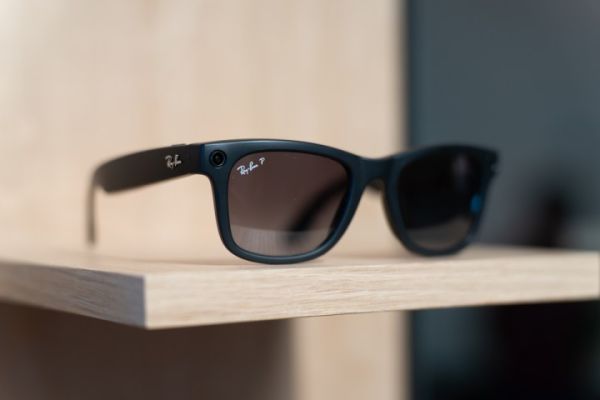
Meta’s latest venture into wearable tech with its AI-powered Ray-Ban smart glasses has raised serious concerns about privacy. The glasses feature a discreet front-facing camera that can capture photos both when users actively request it and when the AI triggers a photo based on certain keywords, such as “look.” While this technology opens new doors for convenience and interaction, it also raises red flags about how these photos are used and whether they could be employed to train Meta’s AI models. Despite growing privacy concerns, Meta has refused to provide a clear answer on this critical issue.
The Ray-Ban Meta smart glasses, a product of Meta’s collaboration with the eyewear company Ray-Ban, are equipped with advanced AI capabilities that allow them to take photos autonomously. Users can verbally prompt the glasses to take a photo or scan an area with commands like “look,” which triggers the camera to capture images without manual input. These photos are then stored in the cloud for various uses, including real-time video streaming, object recognition, and more.
While this feature is undeniably cutting-edge, the passive nature of how the glasses capture images can lead to users taking photos without fully realizing it. For example, asking the glasses to scan a closet to help choose an outfit could result in dozens of photos of the user’s personal space being uploaded to Meta’s servers. As a result, concerns over privacy and data security have surged, particularly regarding how Meta might use these photos once they are uploaded.
When asked directly whether Meta plans to train its AI models using images captured by the Ray-Ban Meta glasses, the company declined to offer a clear response. In an interview with TechCrunch, Anuj Kumar, a senior director at Meta working on AI wearables, stated, “We’re not publicly discussing that.” Similarly, Meta spokesperson Mimi Huggins offered no further clarification, saying only, “We’re not saying either way.”
This lack of transparency is troubling, particularly given Meta’s past actions regarding user data. The company has already admitted to using publicly available posts from Instagram and Facebook to train its AI models. However, there is a significant difference between social media posts, which users often know are public, and the personal, real-time photos taken by a pair of smart glasses. Yet, Meta’s refusal to address these concerns directly has only fueled speculation about how it plans to handle the potentially vast amount of data gathered by these devices.
Meta’s new AI-powered Ray-Ban glasses introduce another significant issue: the sheer volume of photos that could be captured without the user’s explicit awareness. In a report published last week, TechCrunch highlighted a new feature that allows the glasses to stream images in real time. The AI would then use these images to answer questions about the user’s surroundings, such as identifying objects in a room or providing suggestions based on visual cues. This function would essentially result in the creation of a live video stream, with images being uploaded to Meta’s cloud-based AI model for processing.
This raises critical questions about privacy: what happens to the photos and data after they are uploaded? Will Meta store them, and if so, for how long? Most importantly, will these photos be used to train future AI models? Meta has so far declined to address these issues directly, and the company’s past behavior, including its controversial approach to user data on Instagram and Facebook, does little to ease concerns.
The concerns surrounding Meta’s Ray-Ban Meta glasses are part of a larger conversation about privacy and AI in the tech industry. Unlike social media posts, which are often shared with the expectation that they may be viewed by the public, the data captured by wearable devices like smart glasses is far more intimate. The potential for inadvertent photo capture, coupled with the powerful AI models that could process this data, means companies like Meta need to establish clear rules about how this data is used.
Some AI companies have already set clear boundaries on data usage. For example, Anthropic has stated that it does not use customer inputs or outputs from its AI models to train new models. Similarly, OpenAI has confirmed that it does not use inputs or outputs from its API to train its models, ensuring a level of privacy for users. However, Meta has not yet provided such assurances, leaving users in the dark about how their data might be used.
Meta’s history of expansive data collection policies adds to the unease surrounding the Ray-Ban Meta smart glasses. The company has previously defined “publicly available data” broadly, using it to justify the use of social media posts for AI training. However, the world that users see through their smart glasses is far from public, as it includes personal and private spaces that should not be subject to the same level of scrutiny.
Despite these concerns, Meta’s silence on the matter does not inspire confidence that the company will take a more cautious approach to the data collected by its smart glasses. As wearable technology becomes more prevalent and AI continues to evolve, there is an urgent need for clearer policies around data collection and usage. Without such transparency, consumers may be unknowingly contributing to the development of AI models with their private photos and videos.
As Meta continues to develop and roll out its AI-powered Ray-Ban smart glasses, the company’s refusal to clearly address concerns about data privacy is alarming. While the technology offers innovative new ways to interact with the world, the passive collection of images without explicit user awareness opens the door to serious privacy issues. As more users adopt wearable devices, tech companies must be transparent about how they use the data collected, and Meta’s reluctance to provide clarity only deepens concerns about its future plans.
Until Meta provides a definitive statement on how it handles the data captured by its smart glasses, users are left to wonder whether their private moments might be used to train the next generation of AI models.